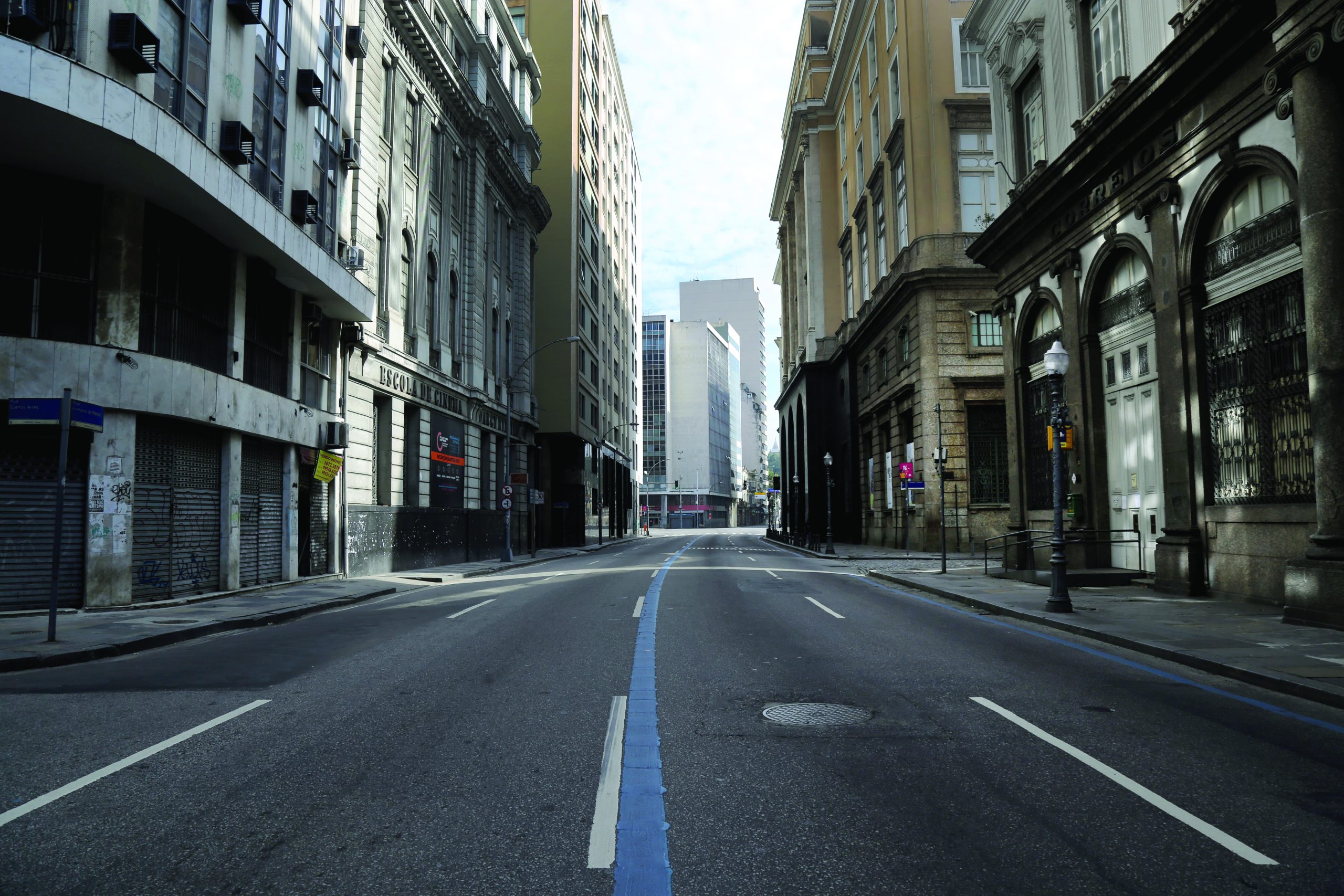In more than ten years of my life at the present address, I had never been so aware of the proximity of the ER (Emergency Room) as in the first wave of the pandemic, when our city closed down for two months and the streets in the city centre got empty. Everything got quiet with only the sirens of ambulances striking thunderously in the silence. The wailing was a sound of pure horror and it used to shake me more than the numbers of newly infected and dead people, while it simultaneously created an invisible contrast between the world outside and the world inside our homes.
Out there, there was only pure emergency. The patients in the ambulances were running out of time, and every minute counted in their struggle for survival. Inside our homes… emergency simply vanished. There was no deadline, there was no ‘at once’, ‘soon’, ‘quickly’ or ‘ASAP’. In March of 2020, any expectation of the everyday normality was shifted somewhere into an unclear future. The world stopped and there was no hurry. At forty I found myself in such a situation for the first time, and it was both pleasant and scary at the same time. Pleasant, as I was offered a possibility of relaxation. And it was scary, as I had to learn to comprehend time in a completely different way.
I was left with almost no work, confined in our apartment with my wife, two children, and an overload of time. We had so much time that we got scared that we would drown in it, and therefore we started to plan the forthcoming days in so much detail as if we were on a journey. We drew schedules for each and every forthcoming day and we finished by drawing fifty-four schedules for the fifty-four days of lockdown. In order to master time. To tame it. And while we were drawing schedules for the days, spent in the apartment, we were listening to the sirens of the ambulances driving the patients to the ER. We listened to the struggle with time, and we heard its trickling. We listened to amplified emergency.
*
Emergency has always been relative in Slovenia. Doctors in our transitional public health system issue notes for specialist checkups with three different designations, ‘regular’, ‘swift’, and ‘urgent’. This may also happen elsewhere in the world, but here such waiting for a specialist checkup gets longer from one year to another, so it is nothing unusual if you are obliged to wait for an ‘urgent’ checkup for a year or more.
Many Slovene patients met their deaths sooner than the opportunity to be scanned with magnetic resonance. It sounds like a joke, I know, but it is not.
Recently a traumatologist friend confided in me that she only issue notes with the label ‘urgent’, as designations ‘regular’ and ‘swift’ have no meaning in her eyes.1 “Everything has become ‘urgent’ as nothing is really urgent anymore,” she said to me. In the best case the label “urgent” on the note means “some time in the near future,” so my friend needs to explain to her patients that she regrets not to be able to deliver a note which would put them on a surgeon’s table within a reasonable and recommended term.
“I feel embarrassed every day,” she says, “when I tell a person that his/her knee should urgently be operated on, and I admit immediately after that he/she will wait for surgery at least for a year.”
If even solving an individual’s health is not really urgent and if even the most urgent medical exams and interventions are not urgent, it is obvious that the understanding of emergency in our society is distorted. For that reason, it is understandable that, during the pandemic, our decision-makers stated again and again, that immediate action to be taken to stem the tide of COVID-19 was urgent, and yet they were late introducing measures—every time. Because they probably did not comprehend the emergency they were talking about.
*
In order to justify the authorities’ views we can only state that emergency is a component of time, and that the comprehension of time is simply relative. In his recent interview for the Slovene DELO newspaper, Kossi Komla-Ebri, the author from Togo who has been living in Italy for almost fifty years, wittily compares the different flow of time in Europe and in Africa.
He explains: “In Africa buses start on their way only when they are full. Therefore, once a man starts his journey, he embarks into unknown, as the time of departure and arrival are completely undefined. Consequently, the future in the mind of Africans is almost nonexistent. The future is an enormous unknown, and nobody even dreams about planning it. Contrary to the Europeans the Africans thus live in the present and do not deal with the future.”2
His words reminded me of several of my waiting hours in South American, African and Asian bus stations and of my very European wife who could never get used to them. Her future was, so to speak, always meticulously planned and this type of uncertainty made her go completely off the rails.
Once we vacationed on the Thai island of Koh Phangan and in the evening prior to our planned departure we were told that our boat may leave the bay the next day or maybe not, due to the weather conditions. My wife got a panic attack and while her to-the-tiniest-detail-elaborated vision of the next few days started to crumble, local people could not understand what the problem was. The boat would leave eventually, they tried to explain to her, if not tomorrow, then probably the day after tomorrow. And almost certainly by the end of the week.


A few years later in Laos, during our wait for a ferry—which travelled with no timetable and was nowhere to be seen approaching us from the other side of a small lake—a Frenchman complained: “I’ve been living here for three years now and still haven’t figured out the travel system of this ferry. You come and wait. Sometimes for several hours. And I can’t understand why.”3
He was an archaeologist, employed in the nearby excavation of the ruins of a former temple, and his task included teaching the locals how to take care of the sites themselves. Yet he was far from any success.
“In the three years I was supposed to train the local people to manage the museum and to maintain the temple which turned out to be mission impossible. With these people there is no connection between yesterday and today as it is with us. Today is not a continuation of yesterday. Actually, it seems to me that, with them, yesterday and today are two completely different worlds. What happened yesterday simply does not exist for the people here. How are we supposed to teach them anything? Today they have no idea of what they were taught yesterday.”
The Frenchman believed that this attitude towards time stemmed in their religion originating in their poverty. “The memory of yesterday’s hunger makes today’s hunger unbearable. Therefore, people gave up their memory and decided that only the present would exist for them.”
This seemed logical. Or rather sounded as an interesting attempt of a European to find his own comprehensible logic in a non-European notion of time. But whatever it was, it is probably true that people all over the world apprehend time and emergency very differently.
*
This is exactly what we could convince ourselves of during the pandemic. Ever since January 2020 the World Health Organisation continued to urge countries to take measures, emphasising the emergency situation that require immediate action. Yet, countries responded very arbitrarily to these calls. Many countries, like Slovenia, responded with a fatal delay, not only in the spring of 2020, when this virus was something new and unknown to all, but also later, in the second, third and fourth wave, when the exact projections of the epidemic already existed and everything became easily predictable. Even then the virus overtook us, we seriously intervened only when the intensive care departments of our hospitals were full to the last hospital bed.
Our response to the pandemic was, in a way, a condensed simulation of the response of humankind to the second, much bigger crisis of our time: climate change. As a matter of fact, more than half a century had passed since the first perception of this, still an unimaginable danger to many, and for decades scientists have been admonishing us that it is necessary to respond urgently. When talking about emergency, the scientists use words and phrases which are normally used to express emergency (at once, now, immediately, today, this moment…) yet they remain unheard all these years.
And it makes me wonder if we are not able to express real emergency with the language we depend on. I wonder if words like ‘at once’, ‘immediately’ or ‘now’ are in fact foreign and not understandable to people, or at least we had failed to translate them effectively. And we thus repeat them in vain to people who would only stare back vacantly at us.
*
Slavoj Žižek, one of the great philosophers of our contemporary times, has been repeatedly talking about communism for the new millennium. Though with the word ‘communism,’ Žižek has been intentionally provoking over-sensitive westerners (western intellectuals?) over the years. He usually explains the Marxist perspective underlying his theories: that global issues cannot be resolved at the level of national states. They need to be solved jointly by humankind, says Žižek, who simply believes that, in order to successfully face climate change or the next, even more mortal pandemic, we need to form a general human, communist-like conscience. And we probably also need to develop a new form of global leadership. We need to understand that we are—as one body of humankind—in trouble, and that we can only resolve it together.
But even, if we succeed in attaining something close to this in the future, if we miraculously succeed in uniting all peoples, races, cultures and religions of this world in our battle against our common enemy, and if we somehow succeed in persuading everyone that it is necessary to act ‘now,’ our problem will still not be resolved. Because as soon as the word ‘now’ is activated, it would have to be translated into approximately 6,500 living languages of our world and we would encounter approximately 6,500 different interpretations of these words and we would end up with 6,500 terms of action.
We could already observe some similar occurring at all of the United Nations climate conferences to date—Glasgow (2021), Paris (2015), and Copenhagen (2009). In principle all the members present, with very rare exceptions, agreed that taking action was urgent and that intervention is necessary ‘now.’ Yet, in setting up the time schedule it always turned out that ‘now’ was an optionally extendable notion and that each country understood the future in its own way.
*
People have a similar difficulty in coming to a mutual understanding of emergency in the everyday life. When a wife asks her husband to vacuum the apartment ‘now,’ or when a mother tells her child to clean his room ‘at once,’ or when a company superior orders a subordinate to send a tender ‘immediately,’ we automatically find ourselves in the sphere of conflict. We usually disagree in our estimate of ‘now’: whether the husband has time to finish reading an article in the newspaper before vacuuming; whether the child can finish his drawing before tidying up his room; whether the employee has time to reply to a few emails before sending the tender. The same applies to the countries’ perspectives at climate conferences; we also often diverge in the understanding of emergency, expressed in the term ‘at once.’ Yet, in everyday life, in addition to verbal communication, we can also use non-verbal communication. We often do not only ‘hear of’ or ‘read of’ an emergency, as we do not grasp it only from the spoken or the written, but we often also ‘feel it,’ we recognise it. In other words, our understanding of emergency greatly depends on the manner in which a word ‘at once’ was spoken, and on the circumstances in which it was delivered.

Therefore, in everyday life a wife to her husband, a mother to her child, and a superior to his subordinate do succeed in pointing out ‘emergency,’ but at the societal level, where there is no non-verbal communication, we encounter difficulties in communicating emergency. Of course, if circumstances help us to identify because danger is visible—if a hurricane is near, or if a war starts—it is clear to us that we urgently need to find shelter. But if danger is invisible, like in the pandemic (or in the case of climate change), emergency often remains ill understood.
*
During the first lockdown, one morning I had accidentally spilled boiling coffee on my son’s knees. As if in a slow motion I watched how coffee from an overturned coffee-pot ran towards the edge of the table and flowed onto my son’s knees. Only when my son shrieked with pain and started jumping around the room, I stirred from my numbness and in a reflex pulled his trousers off his legs, something I was not supposed to do, as by doing so, I also tore the burnt epidermis off his skin which had stuck to his pants.
I carried him, still crying, to the bathtub in order to cool his burning knees with cold water and then, unable to remember where I had left my phone, started running headless around the apartment. And even when I finally found it, I tried in vain to press three digits on my phone to call for urgent medical help. In fact, I was so completely lost that I could not remember number 112 and if my wife hadn’t been there, everything would have turned out very badly.
Until that day, I had always imagined that I was capable and able to keep a cool head in extraordinary circumstances and that even when I was under immense pressure, I was capable of staying rational. Only when my illusion was so mercilessly shattered, I realised that ‘at once’ with me was never ‘at once.’ And I also realised that this was somehow necessary. I became aware that I responded to most matters in my life with a delay as this was my way of protecting myself from losing my head.
I have probably been always afraid of emergency; I subconsciously knew that, in a battle with time I always lose my nerves in one way or another. Deep down I probably knew that, in a hurry, things get out of my control, and when my actions in a panic become thoughtless and hasty, I regularly make mistakes.
And I defended myself by not wanting to recognise emergency. I preferred to delude myself that there was none and that I had plenty of time. In this way I calmed myself and I secured myself a quieter and more rational, although often an overdue, response.
*
Now when I reconsider our society’s repeated overdue response to the pandemic and the fact that we repeatedly did not understand emergency and how our ‘at once’ was never really ‘at once’, I somehow recognise myself in this reticence.
“The forthcoming fourteen days will be decisive!” were repeatedly announced by the authorities, when the situation of the epidemic rapidly deteriorated and the number of infected people in the country started to grow exponentially. And it was always clear that they were talking about some simply virtual time, about the time we did not have, as the time for an efficient action was already over at that very moment.
Obviously, the authorities were afraid of emergency much more than they were afraid of the virus and preferred to consciously fool themselves that action was not actually urgent. “We do not want to cause panic and to frighten people,” they repeated, as if panic and fear was a much bigger danger than the virus itself.
We were afraid that our society in a panic would be as headless and lost as I was when I spilled coffee over my son. We were afraid that our reason would fail us. But we forgot that any reason, capable to grasp emergency, has already failed.
*
“Time comes when there is no more time,” the great Slovene poet Dane Zajc once wrote.3 And it would be hard to better and more accurately put into words the time we live in, the time we are running out of. Yet, in existing languages we are unable to express it or at least to put it down in the way we could understand. Therefore, it is probably necessary to invent a new language, the language of emergency, in which the merciless words of the Slovene poet will be understood by everybody in an equally merciless way.
Because, if we really need to face the challenges of our unpredictable time at the global level, then we undoubtedly also need a language. A language in which we will not be able to delude ourselves, a language in which emergency will not be relative, a language in which ‘at once’ will mean ‘at once.’ We need a language in which time will run equally hastily for all of us.
Unfortunately, Time, when there is no more Time, has already come. And it has come to all of us.





